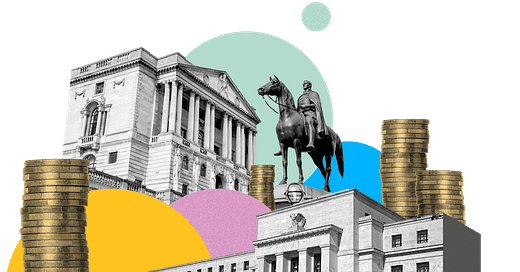Unmasking Central Banks: Market Manipulation, Investing Insights, and the Dawn of the Fourth Industrial Revolution
Abraham George Macro Musings
Lately, I have been delving into the corruption at the Securities and Exchange Commission (SEC). However, let's shift our focus now to the manipulation of central banks.
Firstly, as expected, the Fed decided to skip an interest hike on June 14th, marking the end of a series of ten consecutive rate hikes. In just fourteen months, the Fed raised interest rates from zero to 5%, making it the largest rate increase in the history of the Federal Reserve. Despite this, the 10-year yields are still hovering in the high 3s, forcing the yield curve to invert and leading to widespread predictions of an impending recession. Given their past missteps with market predictions and inflation, Chairman Powell is understandably taking a cautious stance on interest rates, even hinting at the possibility of two more hikes. He's hedging his bets.
Considering that headline inflation is at 4% year over year, next month's report, relative to June 2022, is expected to show a decrease to the mid-3s. The Fed is well aware of this, which is precisely why they decided to skip a hike this month. How can we be so certain about a lower headline CPI number next month? It all boils down to the calculation of the Consumer Price Index (CPI). By examining the CPI index chart from June 2022, we can observe significantly higher numbers. When comparing the year-over-year headline inflation against that higher base, we can reasonably anticipate a figure that falls within the mid-3s range.
However, let's not be naïve about inflation. The recent decline in headline inflation can be attributed to President Biden's strategic release of approximately 40% of the oil from strategic reserves to suppress oil prices in preparation for the midterm elections. Eventually, those oil reserves will need replenishing, leading to an increase in oil prices once again.
Interestingly, although the Fed has raised the Fed funds rate to 5% - 5.25%, surpassing the inflation rate, the 10-year yield stands at just 3.7%. The United Kingdom has taken rates from 0.10% to 4.5%, which is still considerably lower than their high inflation rate of 8.7%, yet the yield on the 10-year UK government bond is only 4.4%. Similarly, the European Central Bank (ECB) has increased rates from negative 50 basis points to 3.5%, while inflation averages around 6%. Nevertheless, the German 10-year yield remains below 2.5%.
Are these market dynamics solely a result of smart bond markets pricing in an upcoming recession? I highly doubt it. This is primarily due to government intervention aimed at fixing market interest rates at affordable levels, thereby avoiding excessive interest costs, a global credit crunch, and sovereign debt defaults.
In all honesty, the central banks don't hide their actions. Last year, during the "rate normalization" period, both the Bank of England (BOE) and the ECB had to step in and rescue their respective government bond markets. In the same month, the ECB ended Quantitative Easing (QE), they had to serve as the buyer of last resort for Italy and Spain, as their spreads widened dramatically. Their actions were somewhat embarrassing, leading to a change in terminology instead of calling it QE. They tried to mask it with a different name.
Shortly after that, the Bank of England had to intervene when the UK government bond yields doubled in just over a month. As for the Federal Reserve (Fed), they managed to keep the 10-year yield below 4% thanks to the collapse of the largest cryptocurrency exchange and the shockwaves it sent through the banking system.
As I've emphasized in previous writings, coordination with the Bank of Japan (BOJ) has been crucial as they continue their money printing and asset purchasing endeavors. This collaboration among major central banks has effectively kept the 10-year yield rates within the 3% to 4% range.
Now, let's shift our attention to the equity markets. The professional investing community has been caught off guard, as they positioned themselves for an impending recession. However, investing based on speculation or hypotheticals doesn't make sense. Your investment decisions should be grounded in what will actually happen.
I've consistently asserted that we witnessed the market lows around 3577 in the S&P 500 back in October 2022. Presently, we have surpassed 20% above those lows. According to conventional wisdom, an official bull market commences when the markets rise 20% from their latest low. However, it remains uncertain whether the bull market is truly beginning now, as we're likely to face increased volatility, similar to what we experienced since the October 2022 lows.
What I am certain of is that we stand on the precipice of rare opportunities as we enter a new industrial revolution. The first industrial revolution emerged with steam engines and mechanized manufacturing, while the second harnessed electricity and facilitated mass production. The third revolution hinged on computers and the internet, transforming economies and creating immense opportunities for investors.
And now, we find ourselves at the early stages of the Fourth Industrial Revolution, where generative AI takes center stage. It's an unprecedented phenomenon. AI is evolving, becoming more sophisticated and capable of independent creation, innovation, and problem-solving. The potential it holds is staggering.
The beauty of it all is that we're merely at the dawn of this revolutionary wave. Countless investment opportunities lie ahead, but it's essential to conduct thorough research and maintain a realistic outlook. Independent thinking, clarity, and honesty are paramount. Contrary to popular belief, the smartest individuals on Wall Street aren't necessarily the top-performing managers. I've encountered them all, and with enough time and effort, anyone can become their own financial manager.
If you received value from this post, and you’d like to send some back, or if you’d like to signal to me to continue spending time on these types of explorations, feel free to buy me coffees (thank you!):
So, there we go. Thanks for reading Breezy Briefings. If you enjoyed this, I'd really appreciate it if you could take a second and tell a friend. Honestly. It makes such a big difference.
Forward this email. Recommend the newsletter. Share on Twitter, WhatsApp, Telegram, LinkedIn, Slack, wherever!
Join Breezy Briefings’ Official Telegram Channel: https://t.me/BreezyBriefings
Abraham George is a seasoned investment manager with more than 40 years of experience in trading & investment and multi-billion dollar portfolio management spanning diverse environments like banks (HSBC, ADCB), sovereign wealth fund (ADIA), a royal family office, and a hedge fund.



